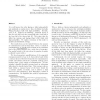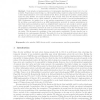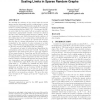124 search results - page 7 / 25 » Randomly supported independence and resistance |
FOCS
2006
IEEE
14 years 1 months ago
2006
IEEE
How much can randomness help computation? Motivated by this general question and by volume computation, one of the few instances where randomness provably helps, we analyze a noti...
RSA
1998
13 years 7 months ago
1998
It is well known that after placing n balls independently and uniformly at random into n bins, the fullest bin holds (logn=log logn) balls with high probability. Recently, Azar et...
SACRYPT
2007
Springer
14 years 1 months ago
2007
Springer
Cache attacks on implementations of cryptographic algorithms have turned out to be very powerful. Progress in processor design, e.g., like hyperthreading, requires to adapt models ...
STOC
2010
ACM
13 years 11 months ago
2010
ACM
We establish the existence of free energy limits for several sparse random hypergraph models corresponding to certain combinatorial models on Erd¨os-R´enyi graph G(N, c/N) and r...
MICCAI
2008
Springer
14 years 8 months ago
2008
Springer
Locating Brain tumor segmentation within MR (magnetic resonance) images is integral to the treatment of brain cancer. This segmentation task requires classifying each voxel as eith...



